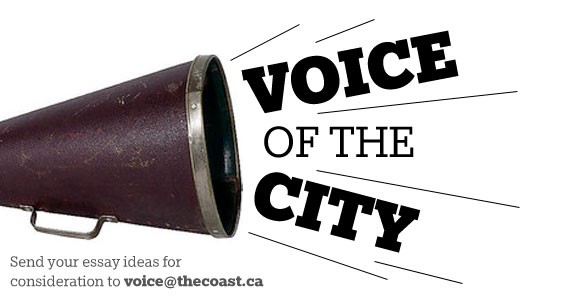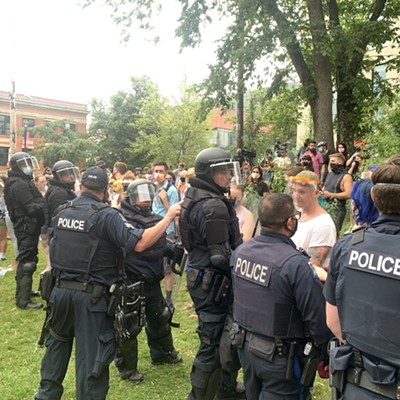Gentrification can build better neighbourhoods
It was a warm summer evening two weeks back. Squiggle Park, the usually vacant lot on the corner of Falkland and Gottingen Street in Halifax’s proud north end, had been transformed into a free, four-hour, pop-up street party called the North By Night Market. There were no Sobeys or Emera banners, no Tim Horton’s stand and no Bell Media table with smiling unpaid interns handing out bumper stickers. The entire event was coordinated by a couple of energetic young entrepreneurs from the area.
Over the course of the evening, Haligonians from all areas, all backgrounds and every age took a walk through. Seniors from Sunrise Manor and the Gordon B. Isnor, breakdancing teenagers, twenty-something students and parents pushing strollers or pulling toddlers all came, ate, danced and met their friends and neighbours (full disclosure, I spun records during the event in exchange for a $75 donation to the community radio station at which I volunteer).
This is a terrible idea, and it must be stopped.
Okay, not really, but this was the rallying cry from a couple of self-styled anarchists who peppered the event’s Facebook page in the days afterward.
The dirty word here, of course, is gentrification. Except gentrification isn’t a dirty word. It’s an economic and sociological concept that can’t be branded as “good” or “bad” the way “cancer,” “pollution” or “the New York Yankees” can.
Gentrification simply happens naturally in urban environments. It’s been occurring since humans started gathering together several millennia back and will continue long after Halifax is a dozen feet underwater.
People move when they believe a new location will provide them better opportunities. This cuts across all geographic, economic and racial lines. It’s why there are 57,000 youth at the Texas-Mexico border, why many of our families came across the Atlantic (or across the Bering Strait) and why there isn’t a decent music venue in Manhattan anymore. People are a migratory species at heart.
Having lived in the north end for a number of years, it seems to me that many of the newer residents here are not “upwardly mobile, yuppie-type folks,” as one of the anarchists described, but working- and middle-class folks who’ve recognized the un-sustainability of modern, suburban life. These new homeowners and tenants have become part of the neighbourhood’s fabric---as a Saturday afternoon at the North Memorial Library, a Saturday night at Charlie’s Club or a Sunday morning at the Detergency Room will show.
Gentrification, when unchecked by communities and municipalities, can push the economically-disadvantaged away. With strong policies in place, however, it can result in greater employment opportunities, safer streets, better schools and improved mental health.
Pressure needs to be placed on city council and property developers to ensure continued development of low-income and mixed-use housing. Additionally, the new businesses springing to life in the north end should be strongly encouraged to hire from within the neighbourhood---whether that’s through education sessions and job fairs from the municipal government and area business associations, or through economic incentives from Halifax and the province.
Some of the Facebook comments suggested discouraging “those people” from coming to “our neighbourhood,” either as residents or even as customers. Sound familiar? It should---that sentiment has been ingrained in Halifax’s social memory for the past few hundred years, albeit usually in the other direction.
As our beloved Gottingen Street celebrates its 250th anniversary this year, maybe it’s time to finally retire the “us vs. them” mentality.Russell Gragg is a journalist and editor raising a family as a renter on Creighton Street. The closest he comes to “upwardly mobile” is climbing the steps into his favourite neighbourhood pub.
Gentrification is class warfare
Any definition of community is political, and pretending otherwise is political in and of itself. Community has context---economic, geographical and historical. Most importantly, you can’t talk about community without using a certain dirty word: class.
I don’t mean to talk about class to the exclusion of other social divisions. In the north end, for example, the relationship between class and race should be immediately apparent in looking at the composition of Uniacke Square. The history of Halifax’s black community in the north end also provides a crucial historical backdrop.
For a bit of perspective, I strongly recommend watching the 1967 cinéma vérité short film, Encounter at Kwacha House. In it, primarily black, working-class youth candidly discuss issues facing the north end. After watching the film, go count the number of black staff at Agricola Street Brasserie. To borrow a famous paraphrase of Marx, history repeats itself; the first time as tragedy, the second time as farce.
The farcical aspect of the supposedly “new” north end is its expressed commitment to values of “community” and “fairness”---values that stand in contrast to its relentless pursuit of capitalist-led development. Unsurprisingly, the “new” north end capitalism is the same rotten affair as always. The interests of upwardly mobile, disproportionately white, disproportionately educated professionals and developers reshape spaces in their hip, fairly-traded, LEED-certified image.
However, this world is well outside of the price range of working-class people. For low-wage workers (disproportionately women and people of colour), the proliferation of $300,000 condominiums and fancy restaurants is at best useless. Generally, it’s worse. These luxuries tend to compete better in market terms, and displace affordable housing and services. That this process includes occasionally “free” events (not that Squiggle Park ever charges admission, or that vendors were giving things away) does not change the fundamental class content of the project.
Alternatives, however, are possible. Contrast the North by Night Market with SadRad and Food Not Bombs’ “Community Potluck & BBQ” last summer. With a budget of basically nothing, two small, anti-authoritarian and anti-capitalist collectives were able to run an event that had more free food, more music and more diverse participation than #NXNMRKT. While the Market catered specifically to the interests and wallets of the ascendant café clique, the Potluck prioritized the people who aren’t celebrating the “accessibility” of stuffed quail on Gottingen Street.
It’s not a coincidence that community events planned and executed by business people whose interests are in establishing a secure, affluent customer base serve the “new” north end community and not working people. It’s not a coincidence that The Coast---funded by this same community’s advertising money---says such events are “magical.” It’s not a coincidence: it’s class war.
I wish I could conclude with an easy, one-size-fits-all solution but, unfortunately, I can’t. I do, however, believe that a diversity of grassroots, community-led organizing projects that actively fight against, rather than accept as a given, the supposed inevitably of capitalism and gentrification can win. In the long run, I even believe we will win.
Sylvain Pankhurst is a member of a tiny libertarian communist group you haven't heard of. He eats ramen noodles daily on principle.



















